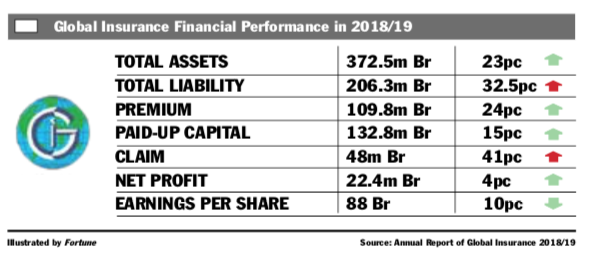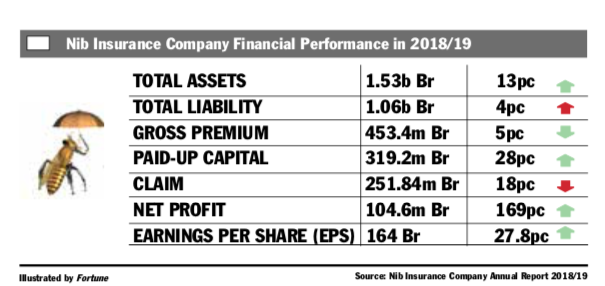
Fortune News | Mar 28,2020
Global Insurance has demonstrated commendable growth, attributed to a strategic shift towards underserved markets in the financial year 2023/24. The company’s venture into Takaful offerings — an insurance system compliant with Sharia law — positioned it as a pioneer in the interest-free sector. Though it still shares a small part of the overall market, Global Insurance's Takaful business has captured the largest market share in this niche area.
The Takaful business, which allows members to pool funds to cover each other's losses, reported a modest share of 127 million Br, representing 0.5pc of the total gross written premiums of the industry, which neared 23 billion Br last year. Less than half of the 18 insurance companies in the market have Sharia-compliant departments actively providing Takaful insurance services. Global Insurance’s “Ahli Takaful” leads this sector with a 45pc market share, followed by Awash Insurance’s “Salaam Takaful” at 31pc, Oromia Insurance’s “Halal Takaful” at 16pc, and Nile Insurance’s “Aman Takaful” at eight percent.
While Global Insurance's profitability lags behind established peers in the industry, its modest increase in earnings per share (EPS) and growth in gross written premiums (GWP) proved the firm on a positive course. Noteworthy growth in gross written premium and commission income are credited as the main drivers of the improved performance.
Board Chairperson Yahya Abdosh informed shareholders during a recent general assembly that Global Insurance has generated the highest gross written premium in the industry, attributed mainly to the Takaful business it has engaged in for the past two years. Although three-fold lower than the private insurance industry average of 903.2 million Br, Global’s GWP increased by 67.1pc to 290.4 million Br, with Takaful contributing about 20pc of the share.
“This is an impressive increase,” said Abdulmenan Mohammed (PhD), a financial statement analyst based in London.
Of this, 19.7pc was ceded to reinsurers, which has slightly increased. Global’s earnings per share have shown a modest increase of five Birr to 150 Br. The 30pc EPS growth is below the industry average by four percentage points, trailing behind United Insurance’s 47.9pc and Nile Insurance’s 39.6pc.
According to Abdulmenan, the modest increase must have been due to the injection of substantial fresh capital. Global boosted its paid-up capital by 18.6pc to 242.16 million Br.
Incorporated in 1997 with an initial capital of 3.75 million Br raised from 23 founding shareholders, Global Insurance now boasts 196 shareholders. One of them, Salahadin Mohammed, who bought shares worth 150,000 Br 10 years ago, wants to see the firm's executives focus on digitisation to enhance service delivery and customer satisfaction, alongside a continued emphasis on interest-free insurance products to expand its revenue base.
The company netted 67.1 million Br from conventional and Takaful businesses, showing 38pc and 34pc growth from the previous year, respectively. These performances are markedly lower than those of its generational peers, such as United Insurance’s 327.02 million Br and Nile Insurance’s 298 million Br. However, Tibebe Tesfaye, chief executive officer (CEO), contended that the shift towards serving the underserved community with Takaful products should not be compared directly with conventional insurance models.
The CEO has misgivings about his firm's comparisons with conventional insurers, calling them "misleading" due to distinct operational models and market focuses.
“It’s tricky,” Tibebe told Fortune.
Running Global Insurance for the past six years, Tibebe began as an underwriter at United Insurance before moving to Teshay and Lion insurance firms up to deputy CEO of operations and claim manager, respectively.
While Global Insurance’s net claims paid and provided for increased by 68.9pc to 108.48 million Br, the figure remains notably lower than the average (341.1 million Br) for private insurer firms, revealing a conservative underwriting culture, particularly for emerging trends such as electric vehicles. United Insurance and Nile Insurance reported claims of 463.54 million Br and 443.5 million Br, respectively.
Tibebe argues that the loss ratio of 44pc indicates that the paid claims share was proportional to the collected premium.
“It grew in proportion with the premium amount,” he said.
Lemi Bane, a manager at the Gulele branch for four years, observed a trend where the company collected premiums for political violence insurance, with many claims paid out, especially in the Oromia Regional State. Lemi has successfully met annual premium collection goals by focusing on selling insurance to multiple vehicle owners. However, he noted that low public awareness about insurance products slows the company’s growth.
Global Insurance has reported an increase in fees and commissions, reaching 34.33 million Br, a remarkable 84.5pc rise from the previous year. However, the company's investment income fell by 5.9pc to 25.04 million Br, a decline attributed to reduced interest income on savings and time deposit accounts. Tibebe attributed funds allocated for constructing a nine-story building near Africa Avenue (Bole Road) to the drop in time and saving deposits.
The insurance company also experienced a rise in expenses. Underwriting expenses climbed to 48.93 million Br, marking a 17.5pc increase, while other operating and administrative expenses rose by 30.3pc to 26.44 million Br.
"We look at cost control and productivity boost packages carefully," Tibebe told Fortune.
Despite the drop in investment income, Global Insurance's total assets grew by 40pc, reaching 821.09 million Br. Of this, 10.72 million Br was held in properties, 100.36 million Br in interest-earning fixed deposits, 78.73 million Br in shares, and 7.73 million Br in government bonds. These investments accounted for 24pc of Global Insurance’s total assets.
Abdulmenan, the industry analyst, urged the importance of efficient asset management.
"This is a small figure," he said, urging the management to collect receivables and place them in investment activities.
He also observed that Global’s capital and non-distributable reserves represent 33.7pc of its total assets, and its cash and bank balances increased by 46pc to 125.9 million Br. Accordingly, the cash and bank balances to total assets ratio rose to 15.3pc from 14.7pc the year before.
According to Abdulmenan, Global Insurance should use its substantial capital to expand its business and efficiently utilise its liquid resources.
"The level of liquidity is much higher than its operational needs," he said, suggesting that the company could benefit from better resource deployment.
PUBLISHED ON
Jun 08,2024 [ VOL
25 , NO
1258]

Fortune News | Mar 28,2020

Commentaries | Aug 19,2023

Fortune News | Nov 27,2018

Fortune News | Dec 14,2019

Fortune News | Mar 16,2019

Commentaries | Jan 27,2024

Commentaries | Sep 10,2023

Viewpoints | Sep 10,2023

My Opinion | Jul 15,2023

Viewpoints | Oct 09,2021

Dec 22 , 2024 . By TIZITA SHEWAFERAW
Charged with transforming colossal state-owned enterprises into modern and competitiv...

Aug 18 , 2024 . By AKSAH ITALO
Although predictable Yonas Zerihun's job in the ride-hailing service is not immune to...

Jul 28 , 2024 . By TIZITA SHEWAFERAW
Unhabitual, perhaps too many, Samuel Gebreyohannes, 38, used to occasionally enjoy a couple of beers at breakfast. However, he recently swit...

Jul 13 , 2024 . By AKSAH ITALO
Investors who rely on tractors, trucks, and field vehicles for commuting, transporting commodities, and f...

Oct 18 , 2025
The political establishment, notably the ruling party and its top brass, has become p...

Oct 11 , 2025
Ladislas Farago, a roving Associated Press (AP) correspondent, arrived in Ethiopia in...

Oct 4 , 2025
Eyob Tekalegn (PhD) had been in the Governor's chair for only weeks when, on Septembe...

Sep 27 , 2025
Four years into an experiment with “shock therapy” in education, the national moo...